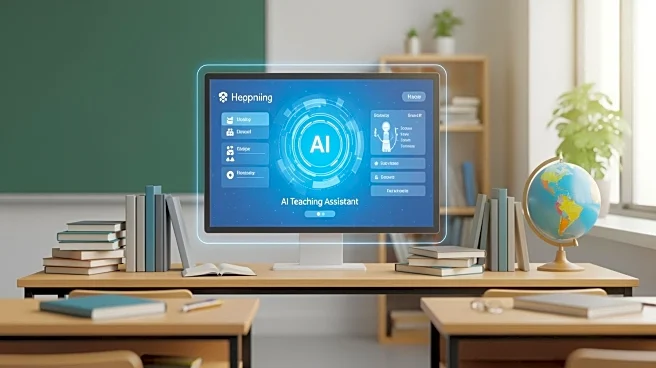What's Happening?
During EdTech Week in New York City, Sarah Johnson, CEO of Teaching Lab, and Abbas Manjee, co-founder and chief academic officer of Kiddom, discussed the transformative potential of artificial intelligence in education. They emphasized that AI should
not merely serve as student-facing software but should be integrated into the curriculum to enhance teaching and learning outcomes. The partnership between Teaching Lab and Kiddom aims to create tools that reflect the dynamic nature of classrooms, supporting teachers in delivering personalized learning experiences. Johnson highlighted the need for a new operating system in schools that provides actionable insights to teachers, rather than just data. The speakers stressed the importance of collaboration between ed-tech companies and educators to ensure the tools developed are effective and widely adopted.
Why It's Important?
The integration of AI in education has the potential to revolutionize how instruction is delivered, making personalized learning more achievable. This approach could significantly impact student engagement and learning outcomes, addressing the longstanding issue of educational tools not reaching enough students to make a measurable impact. By focusing on collaboration and research, ed-tech companies can develop solutions that truly benefit teachers and students, fostering a more effective and inspiring educational environment. The emphasis on coherence and care in AI implementation ensures that technology enhances, rather than replaces, the critical human connections in education.
What's Next?
The ongoing partnership between Teaching Lab and Kiddom will continue to focus on developing AI tools that support teachers in creating personalized learning experiences. As AI reshapes education, stakeholders will need to prioritize measuring the impact of these tools and ensure they are used effectively in classrooms. Ed-tech companies are encouraged to collaborate closely with educators to refine their products and address the '5 percent problem,' where effective tools fail to reach a significant portion of students. The success of these initiatives will depend on the commitment to long-term impact and the willingness to adapt and improve based on feedback from teachers and students.
Beyond the Headlines
The ethical implications of AI in education include ensuring that technology does not replace the essential human elements of teaching. The focus on collaboration and coherence highlights the need for AI to work alongside educators, respecting the relationships they build with students. Additionally, the long-term shift towards personalized learning could lead to more equitable educational outcomes, addressing socio-economic disparities by providing tailored support to students from diverse backgrounds.















